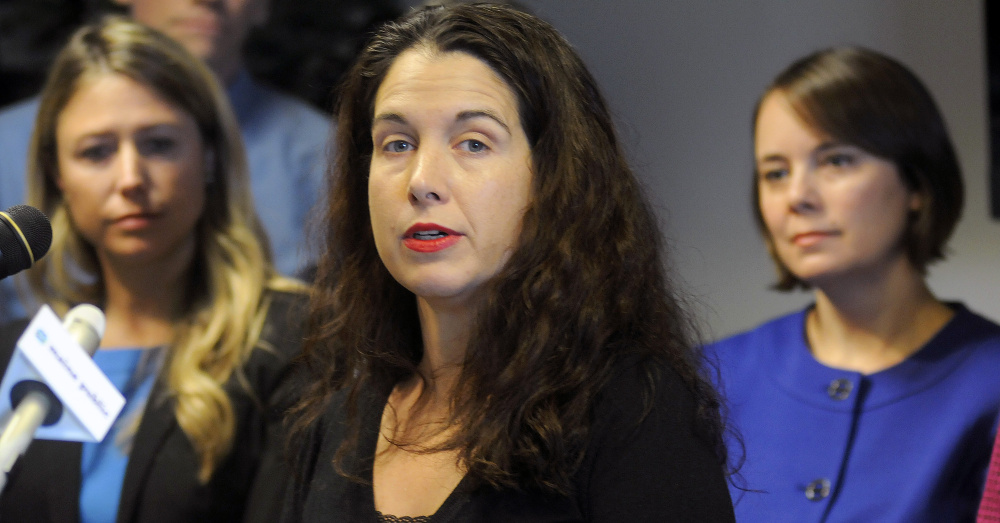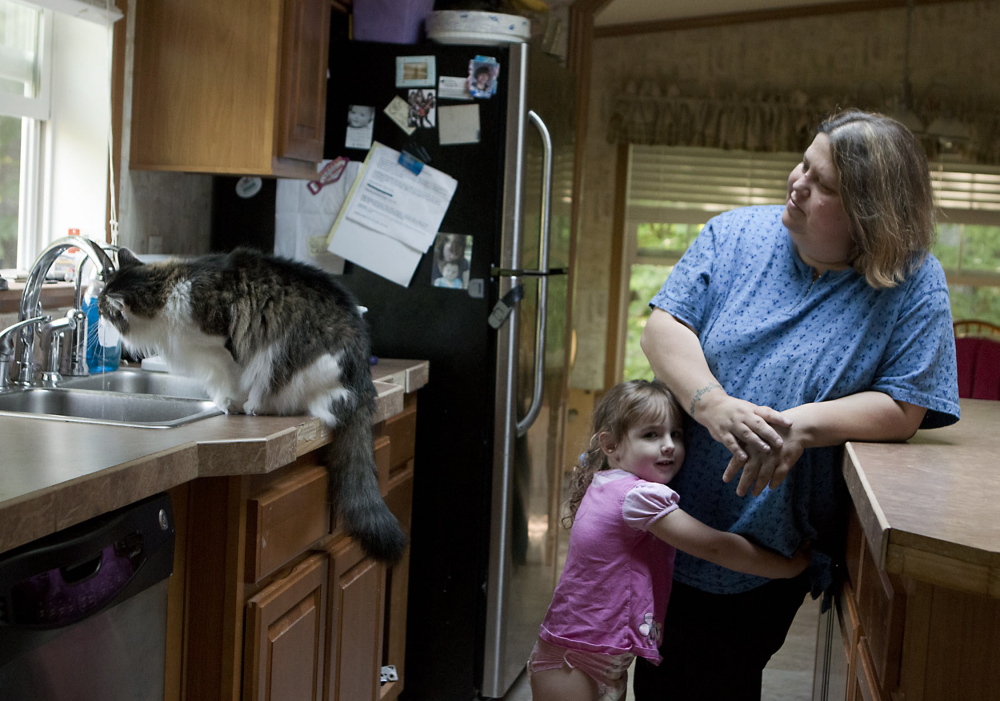AUGUSTA — Wendy Brennan held up a bottle containing what appeared to be crystal-clear, safe drinking water taken from one of the faucets in her home.
But the water contains almost five times as much arsenic as the maximum recommended under a national standard for safe drinking water, Brennan said.
Brennan, a mother and grandmother from Mount Vernon, was joined Thursday at the State House by a bipartisan group of state legislators to introduce a bill that the group hopes will ensure Maine families have safe drinking water.
“For eight years, I didn’t know our water was contaminated,” Brennan said. She found out after one of her daughters took part in a Columbia University study conducted at her elementary school that found a correlation between lower IQ scores and arsenic in drinking water.
The bill would address the lack of awareness that has led to chronic arsenic exposure in Maine by boosting the Maine Center for Disease Control and Prevention’s activities to increase awareness across the state. Under terms of the bill, money generated from state laboratory tests would be directed into a new fund within Maine’s CDC in order to help pay those activities. Additionally, tenants living on well water would obtain water testing results from their landlords, something that isn’t currently required.
Sen.-elect Shenna Bellows, D-Manchester, said she first became aware of the problem when speaking to constituents on the campaign trail in March. She waited until right after the election to get her water tested, and it came back with increased and unsafe levels of arsenic.
“My husband and I have been drinking unsafe well water for years,” Bellows said. “In Manchester, 58.9 percent of the tested wells have unsafe levels of arsenic, so I am very proud to stand with Republicans and Democrats to support this legislation.”
Bellows said a neighbor in Manchester got her well tested after hearing about the Columbia University study, and the test showed her well water had higher-than-acceptable levels of arsenic. Bellows said the same neighbor recently was diagnosed with cancer, and while a direct cause cannot be known, the correlation seems clear.
“We need to figure out what we can afford in terms of treatment, because our options are not to drink the water or to treat it,” Bellows said.
The senator-elect said one of her worries is that a lot of families don’t know that their water is contaminated and the ranges of contamination vary. She wonders how everyone can afford to treat their water.
“I do believe that safe drinking water is a basic human right, and I think there is a role for government to play in helping offset some of the costs (for treatment),” Bellows said. “You should be able to trust that the water you drink or the air you breathe isn’t going to lower your children’s IQs or cause cancer.”
Rep.-elect Kent Ackley, a Monmouth independent, said the towns he represents, which also include Litchfield and Wales, are “in the running for being the arsenic bedrock capital of the state.” He said half of the wells tested in those towns show arsenic levels above the acceptable limit.
“Arsenic is a heavy metal, and heavy metals don’t discriminate,” Ackley said. “It doesn’t matter if you’re from the northern part of the state or from the south or if you’re a child or an adult, and it certainly doesn’t matter if you’re a Republican, Democrat or common-sense independent. There’s arsenic in the bedrock of Maine.”
Ackley said the voters who sent him to Augusta said “loud and clear” that they want changes to their everyday lives.
“Mom and Dad taught me that an ounce of prevention is worth a pound of cure, and no child or adult that is drinking water in the state of Maine should suffer because they don’t know or can’t afford to know if there is arsenic in their drinking water,” Ackley said.
Rep. Drew Gattine, D-Westbrook, said the language in the bill will be similar to the language in one vetoed by Gov. Paul LePage in 2015. That piece of legislation, L.D. 1162, fell just two votes short of overriding the governor’s veto. Gattine said he doesn’t want to make any assumptions about what LePage might do if similar legislation comes across his desk.
“It’s not a political issue,” Gattine said. “I think there is support across the political spectrum to make sure people have clean water, and I hope we’re going to have enough support that it wouldn’t matter if he was going to veto it or not.”
In his veto message, LePage said the bill was unnecessary because the testing of private wells had increased from about 26.5 percent in 2003 to 45 percent in 2012.
Adrienne Bennett, LePage’s press secretary, said Thursday it was too early to comment on the issue without seeing the details of the bill.
Gattine said he thinks a lot of good work has been done to continue to build the public awareness around the issue, and he’s optimistic that a bipartisan coalition will be able to get the bill enacted.
Arsenic is a known carcinogen, according to the Environmental Protection Agency, meaning it causes cancer or helps cancer grow; and it is known to have caused lung, bladder and skin cancer.
“I have two children who have issues brought on by arsenic, and I don’t think that’s a coincidence,” Brennan said. “I have to wonder in 10 years if they’re going to have cancer, or if I’m going to have cancer or if my husband is going to have cancer.”
Brennan said her oldest daughter has a short-term memory deficit and her youngest daughter has generalized and social anxiety, both of which have been attributed to prolonged exposure to arsenic.
“This is going to affect my kids for the rest of their lives,” she said. “You should be able to just drink your water.”
Jason Pafundi — 621-5663
Twitter: @jasonpafundiKJ
Send questions/comments to the editors.






Success. Please wait for the page to reload. If the page does not reload within 5 seconds, please refresh the page.
Enter your email and password to access comments.
Hi, to comment on stories you must . This profile is in addition to your subscription and website login.
Already have a commenting profile? .
Invalid username/password.
Please check your email to confirm and complete your registration.
Only subscribers are eligible to post comments. Please subscribe or login first for digital access. Here’s why.
Use the form below to reset your password. When you've submitted your account email, we will send an email with a reset code.